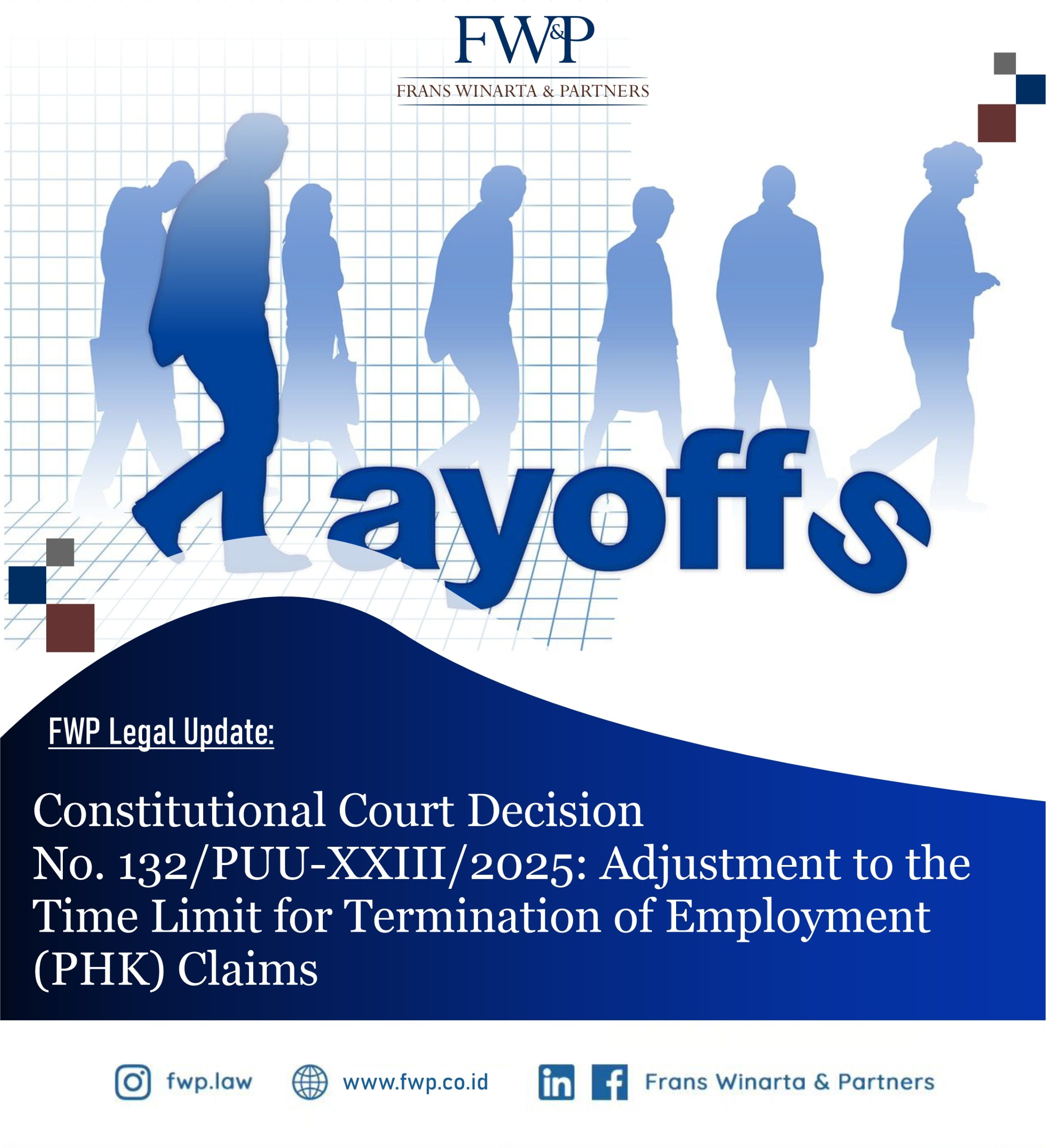Constitutional Court Decision No. 132/PUU-XXIII/2025: Adjustment to the Time Limit for Termination of Employment (PHK) Claims

On 17 September 2025, the Constitutional Court of Indonesia (“the Court”) rendered Decision No. 132/PUU-XXIII/2025 reviewing the constitutionality of Article 82 of Law Number 2 of 2004 on Industrial Relations Dispute Settlement (“Law No. 2/2004”). The provision had previously been interpreted in Constitutional Court Decision No. 94/PUU-XXI/2023, which held that the claims of termination of employment (Pemutusan Hubungan Kerja or PHK) should only be filed within a period of one year from the date the decision of termination is received or notified by the employer.
The judicial review petition was filed by an employee who had been dismissed. The Petitioner argued that one-year limitation violated employee’s constitutional rights as protected under Article 28D(1) and Article 28H(2) of the 1945 Constitution. The period was deemed too short by the Petitioner since employees must first undergo Bipartite and Tripartite negotiations (mediation or conciliation), and obtain a written recommendation from a mediator/conciliator as prerequisites before they can file a claim with the Industrial Relations Court (Perselisihan Hubungan Industrial or PHI). This limitation effectively created a structural barrier to access to justice. The Petitioner therefore requested a three-year extension of the time limit.
In its ruling, the Court partially granted the petition and declared Article 82 of Law No. 2/2004 to be conditionally unconstitutional, insofar as it is not interpreted to mean that termination of employment claims may be filed within 1 (one) year from the date of Tripartite (mediation or conciliation) fails to reach an agreement. The Court reasoned that workers occupy a structurally weaker position in industrial relations, and a rigid limitation period could effectively bar access to justice, particularly for those facing social, economic, or legal literacy constraints. However, the Court found that the three-year period sought by the Petitioner would be too long and could undermine legal certainty for employers in conducting business. Accordingly, the Court determined that a one-year period starting from the failure of Tripartite (mediation or conciliation) strikes a fair balance between the interests of employers and workers, while giving employees a more realistic opportunity to pursue their claims without being disadvantaged by lengthy administrative processes.
This decision marks an important breakthrough in labor law, as the Court embraced a proportionality approach. Instead of outright nullifying the one-year deadline or granting the three-year request, the Court reinterpreted the starting point of the limitation period. It also reflects the principle that formal legal certainty must be reconciled with substantive justice, recognizing that the realities of termination disputes often render the one-year period from the issuance of a termination letter impractical. Employers are not infrequently uncooperative, deliberately prolonging mediation processes to the detriment of employees.
This decision reaffirms that access to justice must take precedence over mere certainty of procedure. It strengthens the implementation of Article 28H(2) of the 1945 Constitution, which guarantees special protection for vulnerable groups. By adjusting the interpretation of the law, the Court guaranteed again the principle of a living constitution; that law must be responsive and dynamic to new social situations.
The Constitutional Court’s decision is final and binding, meaning it acquires permanent legal force immediately upon pronouncement and is not subject to any further legal remedies, therefore it must be complied with by all parties (erga omnes). Nevertheless, it remains essential for Parliament and the Government to revise Article 82 of Law No. 2/2004 to incorporate the Court’s interpretation, so as to avoid confusion or conflicting interpretations in the future. Clear standards should also be established to determine when mediation/conciliation fails and how mediation/conciliation records should be documented, in a bid to provide legal certainty to employers and employees.
In summary, Constitutional Court Decision No. 132/PUU-XXIII/2025 represents a new milestone in Indonesian labor law that sets the direction towards a more equitable framework of industrial relations. The key challenge going forward is to ensure that the decision does not remain merely normative but is fully implemented in practice.
Bibliography:
- The 1945 Constitution;
- Law Number 2 of 2004 on Industrial Relations Dispute Settlement;
- Constitutional Court Decision No. 94/PUU-XXI/2023;
- Constitutional Court Decision No. 132/PUU-XXIII/2025.
Authored by Alessandra Patricia Wijaya (cia@fwp.co.id)
This article is intended to provide a broad summary and general information on certain recent legal developments in Indonesia. It is not intended to constitute legal advice, nor should it be treated as such. FWP disclaims any responsibility or liability for any inaccuracies, interpretations, or omissions contained in this update. For any specific legal concerns or actions that may impact your legal rights and responsibilities under Indonesian law, it is highly recommended that you seek advice from a qualified Indonesian legal professional.


